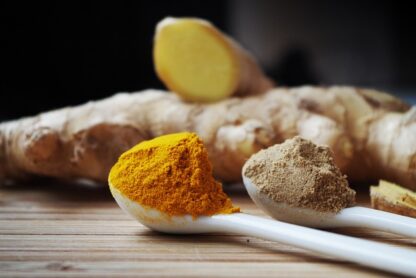Introduction: What are Brain Foods?
When it comes to boosting your memory, focus, and concentration, there are certain brain foods you can eat that will help. These include omega-3 fatty acids, antioxidants, and other nutrients that support cognitive health.
Omega-3 fatty acids are found in fish like salmon and mackerel, as well as in nuts and seeds. They’re important for brain health because they help to protect the brain from inflammation. Antioxidants are another type of nutrient that’s beneficial for the brain. These can be found in fruits and vegetables like berries, leafy greens, and tomatoes.
Other nutrients that are important for cognitive health include vitamin E, B vitamins, and magnesium. Vitamin E is found in foods like wheat germ and almond oil. B vitamins are found in whole grains, dark leafy greens, and eggs. Magnesium is found in dark chocolate, pumpkin seeds, and spinach.
Making sure to include these brain-boosting foods in your diet can help improve your memory, focus, and concentration.
Types of Brain Foods
There are a variety of brain foods that can help to increase memory, focus, and concentration. These include:
- Omega-3 fatty acids: These essential nutrients are found in fish oil and can help to improve cognitive function.
- Blueberries: Blueberries are rich in antioxidants and have been shown to improve memory and cognitive function.
- Broccoli: Broccoli is a good source of vitamins K and C, which have been shown to improve cognitive function.
- dark chocolate: Dark chocolate contains flavonoids, which have been shown to improve cognitive function.
- Eggs: Eggs are a good source of choline, which has been shown to improve memory and cognitive function.
Benefits of Eating the Right Brain Foods
When it comes to eating for brain health, there are certain foods that stand out above the rest. These “brain foods” have been shown to help improve memory, focus, and concentration. If you’re looking to boost your brain power, consider adding these foods to your diet:
- Blueberries: Blueberries are packed with antioxidants and have been shown to promote cognitive function.
- Salmon: Salmon is a good source of omega-3 fatty acids, which are essential for brain health.
- Nuts and seeds: Nuts and seeds are a great source of vitamin E, which has been linked to improved cognitive function.
- Dark leafy greens: Dark leafy greens like spinach and kale are rich in nutrients like iron and folic acid, which are important for cognitive health.
- Eggs: Eggs are an excellent source of choline, a nutrient that has been linked to improved memory and concentration.
How to Incorporate More Brain Foods in your Diet
If you’re looking to improve your memory, focus, and concentration, you may want to consider incorporating more brain foods into your diet. Here are a few suggestions:
- Eat more fish. Fish is a great source of omega-3 fatty acids, which are essential for cognitive function. Aim for two servings of fish per week.
- Load up on leafy greens. Leafy greens like spinach and kale are rich in vitamins and antioxidants that can help to protect the brain from damage. Add them to salads, soups, or smoothies.
- Nuts and seeds are another excellent source of brain-boosting nutrients like omega-3s, vitamin E, and magnesium. Snack on a handful of nuts or seeds daily, or add them to yogurt or oatmeal.
- Berries are packed with polyphenols – powerful antioxidants that have been shown to promote brain health. Enjoy fresh berries as a snack or topping for breakfast cereal or oatmeal.
- Coffee and tea are great sources of caffeine – a natural stimulant that can improve focus and concentration. Drink one cup of coffee or tea per day, either in the morning or afternoon when you need a mental boost.
5 Specific Brain Foods
There are many different foods that can help to boost your brain power and memory, but some are more effective than others. Here are a few specific brain foods that you should include in your diet to improve your memory, focus, and concentration:
- Blueberries: Blueberries are often referred to as “brain berries” because of their high levels of antioxidants, which protect the brain from damage caused by free radicals. They also contain compounds that can help to improve communication between brain cells.
- Salmon: Salmon is a great source of omega-3 fatty acids, which are essential for proper brain function. Omega-3s have been shown to improve memory and cognitive function, and they may also help to protect the brain against age-related decline.
- Nuts and Seeds: Nuts and seeds are packed with nutrients that are essential for brain health, including vitamin E, magnesium, and healthy fats. They can help to improve blood flow to the brain and protect against cell damage.
- Dark Chocolate: Dark chocolate contains flavonoids, which are compounds that can help to improve cognitive function and memory. Flavonoids can also protect the brain against age-related decline and diseases such as Alzheimer’s disease.
- Coffee: Coffee is a great way to get a quick boost of energy and mental alertness. It also contains caffeine, which can help to improve memory and cognitive function.
Fish
Fish is one of the best sources of brain-boosting omega-3 fatty acids. Numerous studies have shown that omega-3s can improve memory and cognitive function. Salmon, tuna, herring, and sardines are especially good sources of omega-3s.
Nuts and Seeds
Nuts and seeds are a great source of nutrients that can help improve your memory, focus, and concentration. They are packed with vitamins, minerals, and antioxidants that can help keep your brain healthy and functioning at its best. Here are some of the best nuts and seeds for brain health:
-Almonds: Almonds are a good source of vitamin E, which is important for cognitive function. They also contain magnesium, which has been shown to improve memory and cognitive performance.
-Walnuts: Walnuts are rich in omega-3 fatty acids, which are essential for brain health. They also contain antioxidants that can help protect the brain from damage.
-Pumpkin seeds: Pumpkin seeds are a good source of zinc, which is essential for cognitive function. They also contain iron, which is important for blood flow to the brain.
-Sunflower seeds: Sunflower seeds are rich in vitamin E, which is important for cognitive function. They also contain selenium, which has been shown to improve mood and cognitive performance.
Blueberries
Blueberries have been shown to be effective in improving memory, focus, and concentration. A study published in the Journal of Agricultural and Food Chemistry found that blueberry supplementation improved memory performance in young adults. Another study published in Frontiers in Aging Neuroscience found that blueberry consumption improved cognitive function and reduced brain inflammation in older adults. Blueberries are a rich source of antioxidants and phytochemicals, which may explain their beneficial effects on cognitive function.
Whole Grains
Whole grains are an excellent source of complex carbohydrates, which are essential for brain health. They also contain vitamins, minerals, and fiber. Studies have shown that people who eat whole grains have a lower risk of cognitive decline and memory problems.
Whole grains include: oats, barley, brown rice, quinoa, buckwheat, and whole wheat. You can find whole grain products in the bread aisle of your grocery store or in the health food section. When choosing breads, look for those that list whole wheat or another whole grain as the first ingredient.
Avocado
Avocados are not only delicious, but they’re also packed with nutrients that are essential for brain health. Avocados are a good source of monounsaturated fats, which have been shown to promote cognitive function. They’re also a good source of vitamin E, which is important for maintaining healthy cells. In addition, avocados contain compounds that may help to protect the brain from damage.
Tips for Maximizing Your Intake of Brain Foods
In order to maximize your intake of brain foods, there are a few tips you can follow. First, include a variety of brain-healthy foods in your diet. This ensures that you are getting a wide range of nutrients that are essential for optimal brain function. Second, eat brain-healthy foods regularly. Consistency is key when it comes to maintaining healthy eating habits. make sure to incorporate brain-healthy foods into your diet on a daily basis. Third, take advantage of Brain Supplements. While food is the best way to get the nutrients your brain needs, supplements can be beneficial as well. There are a variety of supplements on the market that contain ingredients that have been shown to support cognitive health. Be sure to do your research and choose a supplement that is backed by science. fourth, stay hydrated. Drinking plenty of water is essential for overall health, but it is especially important for brain health. Dehydration can lead to fatigue and impair cognitive function. Be sure to drink plenty of fluids throughout the day, especially water, to keep your mind sharp.
Conclusion
Incorporating these brain foods into your diet can help increase memory, focus, and concentration. Eating the right types of food is essential for good mental health and overall well-being. Not only will eating these foods help improve your cognitive abilities, but they are also nutrient dense and packed with antioxidants which can help protect your body from damage caused by stress or aging. It’s important to remember that a balanced diet is always best so make sure you are eating a variety of healthy foods every day for optimal brain health!









